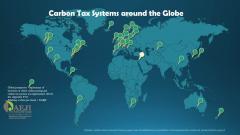
AEJI Climate Justice Research and Economy Policy Report No. 5 – 2017
Policy Proposal
Implementing a Fair Carbon Tax in Israel
Research:
Ro'ee Levy
* Note to English version:
Since the publication of the original document (in Hebrew) there have been minor changes in policy (such as Israel's GHG emission reduction plan, following the Paris Agreement), and the document has only been partially updated to reflect these changes. However, the essence of the information in this document pertaining to the implementation of a just carbon tax in Israel, remains pertinent.
Abstract
Israel has recently developed a new target for mitigating Greenhouse Gas (GHG) emissions, in preparation for the Paris Agreement. It is therefore appropriate for the State to consider pricing its carbon, as it is one of the more effective steps to generate substantial reductions in emissions in the long term. With the exception of Turkey, Israel is the only OECD member country in which no national or regional carbon pricing system is in place, nor is one being planned. Carbon pricing does not merely help meet emission mitigation targets, but has additional associated benefits, of reducing local air pollution and fostering the transition to a low-carbon industry.
In Israel, it would be preferable to apply a carbon tax rather than an emissions trading system. First, a carbon tax is simple to implement, and in fact, a similar tax is already being levied as part of the excise tax on fuels, whereas an emissions trading system entails operational costs and might include many breaches. Second, the number of potential companies that would partake in an emissions trading system is relatively small, so that a limited number of companies might gain market power; whereas on the other hand, an extensive carbon tax can be applied to a vast majority of emissions in the country. Furthermore, emissions trading systems tend to award free permits to polluters, thus making the system a regressive one. However, a carbon tax increases national revenues and enables the use of these revenues to minimize inequalities.
The tax on carbon must be applied to all fossil fuels, and gradually also include additional sectors, such as agriculture, forestry and waste. In practice, it might not be necessary to raise the current tax on gasoline and diesel fuel, but it is important that part of the excise tax should be defined as a carbon tax, and that it will be consistent and applied in the same manner to all sources of pollution. A carbon tax is expected to substantially increase the taxation of coal and natural gas, considering that presently the excise tax does not reflect negative externalities caused by the use of these fuels. In order to ensure certainty for the industry, as well as to encourage emission reduction projects, it is important to predetermine an outline for a gradual increase of the carbon tax over a number of years, and to not modify it arbitrarily.
A carbon tax has two potential drawbacks. First, such a tax can be regressive, since a higher rate of the income of lower-income households is directed towards energy use. It is therefore essential to use the tax revenues to make it more equitable. By means of designating tax revenues either to reducing VAT or to the payment of a 'Carbon Dividend' to residents, regressive impacts of the tax could be completely offset. Another possibility is the promotion of environmental social projects, such as more qualitative public transportation. A second potential disadvantage of a carbon tax is harming the competitiveness of local industry; however, this risk seems to be less relevant to Israel, considering that even if a tax would be applied fully to coal and natural gas, prices of electricity and natural gas for industrial uses still would not be high in relative terms, compared to the rest of the world.
In summation, a carbon tax has distinct environmental benefits. The tax is efficient, as it can replace taxes that create distortions and are damaging to growth; and furthermore, the tax could have social benefits if its revenues are used wisely. However, the promotion of a carbon tax requires political leadership. It is important that decision makers explain the benefits of the tax to the public, institute full transparency of the usage of tax revenues, and not be tempted to arbitrarily modify the tax or exempt certain sectors due to political pressure. This way, it should be possible to advance a significant reduction of GHG emissions in Israel in an effective manner, and without exacerbating inequalities.

